-

感恩教育国旗下讲话:《心存一颗感恩之心》小学
本文是由编辑为您准备的感恩教育国旗下讲话:《心存一颗感恩之心》小学,请大家参考!感恩教育国旗下讲话:《心存一颗感恩之心》小学老师们、同学们:各位老师,同学们:早上好!今天我讲话的题目是:心存一颗感恩之心。俗话说“谁言寸草心,报得三春晖”,“滴水之恩,当涌泉相报”,知恩图报是中华民族的传统美德。同学们,我们要懂得感恩。我们要感激父母,感谢他们给了我们生命,感谢他们搀扶我们走好每一步人生之路,为我们搭建快乐成长的舞台。我们要感激老师,感激他们传授我们知识,让我们拥有智慧、拥有克服困难的力量和奋发图强的信心。我们也要感激在我们成长道路上循循善诱的长辈,感激陪伴我们成长的朋友们。“感恩之心”可以以不同的方式化为“感恩之行”,作出一些我们的回报。
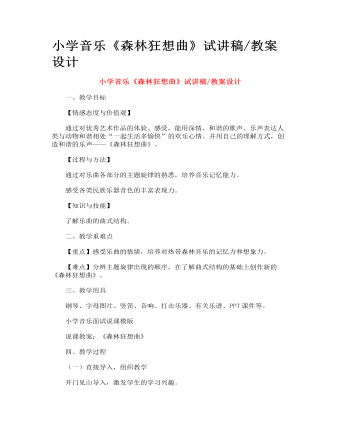
小学音乐《森林狂想曲》试讲稿_教案设计
阶段目标:分辨民族乐器——曲笛和西洋弓弦乐器——小提琴的音色魅力及演奏方式。乐曲主题是由两种不同类别的乐器主奏的。一是民族吹管乐器——笛子;还有就是大家非常熟悉的西洋弓弦乐器——小提琴。它们同属于高音乐器,音域很宽,高音明亮,表现力非常丰富。现在老师放两段音乐片段,你们听一听是用什么乐器演奏的?可以模仿一下这种乐器的演奏姿势。教师播放主题A,播放主题B。(课件6)生:主题A是用笛子演奏的,主题B是用小提琴演奏的。师:作者用笛子和小提琴一中、一洋两种乐器,轮流奏响主题,似一个热闹的开场白。

关于数学教研工作计划范文3篇
1、继承和发扬我组教师良好的师德修养、爱岗敬业的精神、良好的教风和教学研究的热情。在全组发扬团队意识、合作意识和竞争意识,构成浓厚的教研之风、互学之风、创新之风。 3、在学习、实践、研讨中更新教师的教学观念,探索,总结新课程的实践经验,进一步提升本组教师的教科研本事,组建一支适应新课标要求的数学教师队伍。 4、规范数学教学常规,教学质量再上新台阶。 5、加强优质课评比,挖掘骨干教员。

活动名称:中班数学:纽扣分类
2、复习点数6以内数量的技能。 3、乐于参与操作活动,感受发现的快乐。活动准备:大记录纸一张;幼儿人手一份纽扣、二个盘子、一张记录纸、铅笔;投影设备。活动过程:一、导入:观察老师衣服上的纽扣,数数有几粒。 二、观察多样的纽扣。1、师:小朋友,这些都是什么呀?(纽扣)数数一共有几粒?这些纽扣是什么样的?(幼儿相互交流)
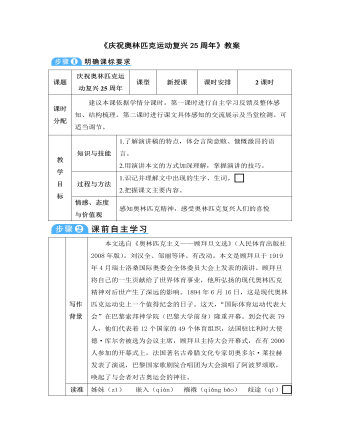
部编版语文八年级下册《庆祝奥林匹克运动复兴25周年》教案
2004年的雅典奥运会上,孔令辉获得冠军时忘情地亲吻胸前的国徽时,王军霞夺得金牌后激动的身披国旗绕运动场奔跑时,我们的泪水也会与领奖台上以手抚着胸前国徽高唱国歌的运动员的热泪一起落下。为了看体育比赛,我们甚至不惜守候到半夜而无怨无悔。在半夜看比赛时,我总在想:是什么让我们“为伊消得人憔悴”,为什么“总有一种力量让人泪流满面”。现在我有了答案:那是一种奥林匹克精神在激励着我们,在提升着我们。奥林匹克精神的内涵是丰富的。国际奥委会主席罗格在其就任宣言中指出:“奥林匹克的格言是更快、更高、更强。在新世纪来临的时候,或许对体育来讲需要新的格言,那就是更干净、更人性、更团结。” 奥林匹克精神让我们振奋,今天我们就来学习这篇课文《庆祝奥林匹克运动复兴25周年》。
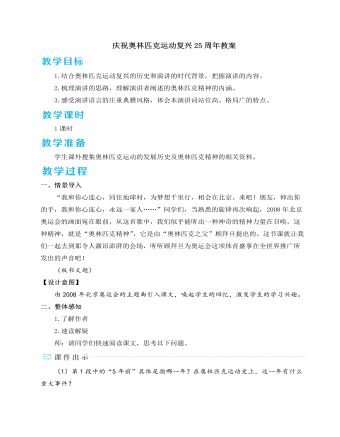
人教部编版语文八年级下册庆祝奥林匹克运动复兴25周年教案
(3)推荐男女生代表各一位在全班进行演讲展示。 (4)围绕“讲”和“演”两方面的技巧,点评演讲效果。(生开展演讲活动,师指导)【设计意图】本环节通过集中梳理演讲技巧,并设计演讲技巧进行演讲展示,引导学生将理论知识逐步运用于具体的演讲实践中,提高学生的演讲能力。五、总结存储1.教师总结现代奥林匹克运动的创始人顾拜旦面对世界政治格局剧变的局面,以战略家的视野指出奥林匹克精神的内涵与价值,用诗歌般的语言阐述了奥林匹克平和自信的内涵,提出了奥林匹克运动的宗旨是教育,是面向大众,是促进和平、公平、公正。他激情澎湃地畅想美好前景,确信奥林匹克精神必将如阳光般普照大地。整篇演讲词站位高、格局广,语言庄重、典雅,值得我们用心体会。2.布置作业学校即将举行春季运动会,如果你被邀请在运动会的开幕式上作为学生代表发言,你将如何演讲?结合你对奥林匹克运动的精神的理解,写一篇300字左右的演讲词,并适当设计一些演讲技巧。
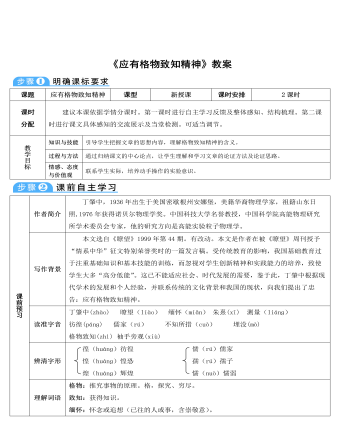
部编版语文八年级下册《应有格物致知精神》教案
【深入研读,探究方法】1.思路清晰、缜密。开头紧扣论题,由“格物致知”的出处,引出对其含义的理解以及我国古代并不重视真正的“格物致知”的原因分析,澄清人们的错误认识;接着作者从实验过程的两个特点、中国学生存在的问题和作者自己的亲身经验三个方面分析真正的“格物致知”精神的重要性;最后指出真正的“格物致知”精神的两个意义,并发出号召。全文思路清晰,说理严密。2.举例论证、道理论证和对比论证相结合,论述充分有力。文章在列举事例时,采用正面事例和反面事例相结合的说理方法。如反面事例,文中第4段举了王阳明“格”竹子的事例,证明了中国传统的教育并不重视真正的格物致知;在第11段摆了中国学生大都偏向理论轻视实验的事实;第12段又举了自己到美国念物理时吃的苦头。
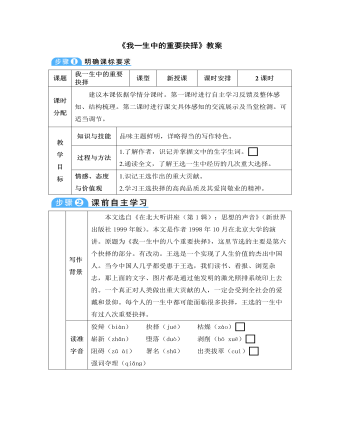
部编版语文八年级下册《我一生中的重要抉择》教案
(1)一个快落山的太阳,跟大家讲的,更多的是自己一生奋斗过来的体会。指61岁的老人。(2)加入人家说我是权威,也许还马马虎虎。作者自谦的说法,指成绩还过得去。(3)明明是一个过去时态,大家误认为是现在时态。指作者认为自己不适合再做权威了。(4)扶植年轻人我觉得是一种历史的潮流,当然我们要创造条件,就是把他们推到需要刺激的风口浪尖上。比喻重要的岗位或市场的前沿。【感悟精彩句子】1.所以我知道自己是一个下午四五点钟的太阳。各位呢,上午八九点钟的太阳,这是本科生;硕士生呢,九十点钟的太阳;博士生呢,十点十一点钟的太阳。比喻,拉近了与听众的距离,倍感亲切、期望和鼓舞。2.所以1992年前电视台采访我,我基本上都拒绝了。透过细节,体现了坚持不懈的科研精神。

部编版语文九年级下册《祖国啊,我亲爱的祖国》教案
4.联系作者的写作背景赏析第三节,说说第三节中的意象有怎样的象征意义。通过这些意象,我们可以看出作者的思想感情有怎样的变化?明确:意象:“神话的蛛网”“雪被下古莲的胚芽”“挂着眼泪的笑涡”“雪白的起跑线”“绯红的黎明”。“神话的蛛网”象征束缚生产力发展,钳制思想解放的专制统治和陈腐意识,只有挣脱了“神话的蛛网”才能诞生“簇新的理想”;“雪被下古莲的胚芽”“挂着眼泪的笑涡”“雪白的起跑线”“绯红的黎明”这些意象在时空上大幅度跳跃,构成了立体交叉象征义,象征着祖国成长的苦难历程、再生的悲喜、新长征的开始和未来的美景。上述意象有一个共同的特征,那就是代表着希望,代表着开始。作者正是用这些意象,表现着自己的欣喜与激动。

人教版新目标初中英语七年级下册Where is the post office教案2篇
Period 2 (3a----Section B 2c)Preview(Pre-task): Key points: What laAdd another information about their pen pals----their language on the cardnguage does she/he speak?She/He speaks....Does she/he have any brothers and sisters? Does she/he speak English?Preview(Pre-task): Add another information about their pen pals----their language on the cardKey points: What language does she/he speak?She/He speaks....Does she/he have any brothers and sisters? Does she/he speak English?Step 1 Revision1.Revisionand dictation of the new words 2.Revise the drills they learned yesterday.(by pairwork and grammar exercise)Step 2 Leading-inT has a conversation with one student. The conversation is following:---Do you have a pen pal?---Yes, I do.---What's your pen pal's name? ---His/Her name is....---Where is your pen pal from? ---He/She is from...---Where does he/she live? ---He/She lives in....---What language does he/she speak?He/She speaks...Write the new words on the Bb. They are following: EnglishChineseJapaneseFrenchStep 3 LearnLearn the new words with the whole class.Finish 3a with the students3b Pairwork T still does an example with one student Then the Ss practise in pairs. The example is following:--Curry Muray is my pen pal. He is from the United States.---What language does he speak?

人教版新目标初中英语七年级下册I want to be an actor教案2篇
三、教学建议第一课时:1. Lead in (Vocabulary)A) Before class, teacher should collect some pictures of working places. For example: Bank, TV Station, Restaurant, Police Station, Hospital ...B) In class, show students the pictures (PowerPoint, OHP). Ask students to tell the name of the working places and the name of the jobs.Shop assistant, doctor, actor, reporter, police office, waiter, bank clerk, studentC) Do exercise 1a and 3a.2. Bingo GameAsk groups of students to make up pairs of cards with a job on one and the related workplace on the other. For example, waiter / restaurant, teacher / school, doctor / hospital. Encourage students to use both the job / workplace combinations in the book and the ones that students came up during class discussions. Be sure they have twice as many sets of cards as there are students in the group. They can make two sets of cards for a single job / workplace, if necessary. Then have each group mix up its set of cards and hand their cards out in random order. Each time a student gets a pair of cards that match, he or she can lay these cards down. The goal is to have no cards in your hand at the end.3. Task OneA) Ask students to work in pairs and ask the partner what does he / she want to be in the future.e. g. :What do you / does he / does she want to be?I want to be a.Why?Because it's (adj).B) Vocabulary: Section B, 1a4. Homework 1.2.
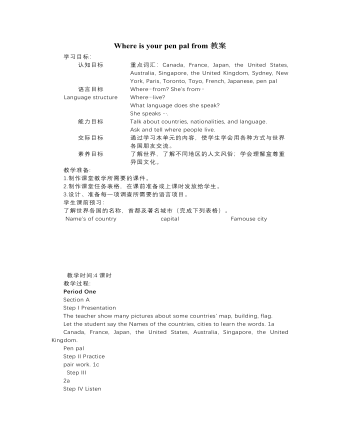
人教版新目标初中英语七年级下册Where is your pen pal from教案
2.1Match the country with the language.Step II Reading3a? let the students read the letter fast and answer the questions.? Let the students ask more questions about the letter as possible as the can.Step III Writing3b.Step IV. Pairwork2cStep V Listening2a, 2bStep V. HomeworkExercises book(1) P3Exercises book (2) P3Period FourStep I . Dictate the words and sentences in Unit1.Step II. Self-checkStep III. Check the answers for Exercises book in the unit.Step IV. Home workRevise and preparation for unit 2.教学反思:通过本单元的学习,学生基本可以谈论人们的国籍,居住城市及其所说的语言,通过书信方式去介绍自己并寻找笔友。但在涉及到国外的一些城市时,学生对这方面的知识相对欠缺,能介绍的城市并不多,也反应出学生课前预习不充分,这跟学生学习条件也有关,大多数学生无法通过网络获取所需信息。因此,在以后的教学中要多指导学生通过计算机网络获取信息,拓宽知识面。

人教版新目标初中英语七年级下册Why do you like koalas教案2篇
单元整体说明(一)单元教材分析本单元的核心话题是描述动物和表达个人喜好,以及句式why do you like…? Because…。这也是本单元的教学重点。通过本单元的学习,学生应能较流利地运用所学词汇和句型描述动物,表达个人喜好。(二)单元知识结构1.词汇动物名称 tiger, elephant, koala, dolphin, etc.词汇描述性形容词: smart, cute, ugly, clever, shy, etc.国家名: Australia, South Africa2.句型Why do you like koala hears? Because they are cute.Where are pandas from? They're from China.What animals do you like? I like dolphins.(三)单元整体目标1.Master the vocabulary2.Master and use: Why do you like koalas? Because they am cute.Where are pandas from? They're from China.What animals do you like? I like dolphins.(四)单元教学重难点一览(五)单元学情分析学生此前已经学过由why, where, what 引导的特殊疑问句句型,具有了学习本单元知识的认知前提。形形色色的动物能激发学生的好奇心,产生了解它们的欲望,这有利于本单元知识的教学和学生学习兴趣的培养。
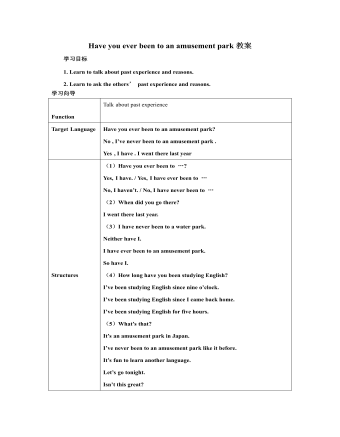
人教版新目标初中英语八年级下册Have you ever been to an amusement park教案
(1)Have you ever been to …? Yes, I have. / Yes, I have ever been to …No, I haven’t. / No, I have never been to …(2)When did you go there? I went there last year. (3)I have never been to a water park. Neither have I. I have ever been to an amusement park. So have I. (4)How long have you been studying English? I’ve been studying English since nine o’clock. I’ve been studying English since I came back home. I’ve been studying English for five hours. (5)What’s that? It’s an amusement park in Japan. I’ve never been to an amusement park like it before. It’s fun to learn another language. Let’s go tonight. Isn’t this great?space museum, amusement park, water park, South America, Peru, Holland, European culture, tour guide, flight attendant, musical instrument, more than, be from, get to, take lessons, neither, discover, graduate, change

人教版新目标初中英语八年级下册It’s a nice day, isn’t it教案2篇
"Hello! Welcome to English class! Introduce yourself. Meet your new classmates." That's what the teacher says. What do you say? "Oh no!" It can be difficult talking to new people. But it can be fun, and you can make friends. How do you do it? Make small talk. Small talk is polite conversation. "Wang Nan is a great pingpang player, isn't she?" "I'd love to meet her, wouldn't you?" "It's been raining a lot, hasn't it?" Tag questions are a form of polite speech. To make small talk successfully, you should know how to make them. You should also know what topics to talk about. Try to learn this unit carefully. The next time you're in English class, you'll find out. Making small talk's easy, isn't it? (“你好!欢迎你!请做一下自我介绍。认识一下你的新同学。”通常在课上老师会这样说。你会说什么呢?“噢,不!”与陌生人谈话太困难了。但是这也很有意思,并且你还能交到朋友。你该怎么做呢?闲聊。闲聊指得是礼貌的对话。“王楠是一个很棒的乒乓球运动员,不是吗?”“我希望自己能认识她,你呢?“今年的雨水很多,不是吗?”反意疑问句是一种礼貌用语。为了使得谈话成功,你应该知道怎样去进行闲聊。你还应该知道与不同的人该谈论什么样的话题。认真的学习这个单元吧,下次在英语课上,你会发现与大家展开谈话是一件很容易的事情,不信我们来试试。)

人教版新目标初中英语八年级下册He said I was hard-working教案2篇
This activity introduces some new vocabulary and provide oral practice using the target language.Task 1 . Ask four students to stand in front of the class, and the teacher asks them the following questions as a reporter.1.What are you going to do when you grow up?2.What are you going to do next week?3.What are going to do after school?The students will give different answers, then ask a good student to report what they said.I am going to e a doctor.What did she say?----------She said she was going to be a doctor.I am going to have a party on Friday night.What did he say?-------He said he was going to have a party on Friday night.I am going to do my homework.What did she say ?------ She said she was going to do her homework.I am going home after school.What did she say?-----She said she was going home after school.Say In this unit we are going to learn to use words like to report what someone said.Task 2. Read the instructions. Then ask a student to read the four questions. And write the words on the Bb. Explain what soap opera is.Task 3. Ask the students to Look at the pictures, point out the TV screens in the picture. Ask one girl to read what Marcia said.What did Marcia say? She said She said she was having a surprise party for Lana on Friday night. Repeat the other pictures in the same way.Activity3. Listen and number the pictures in activity 1a.
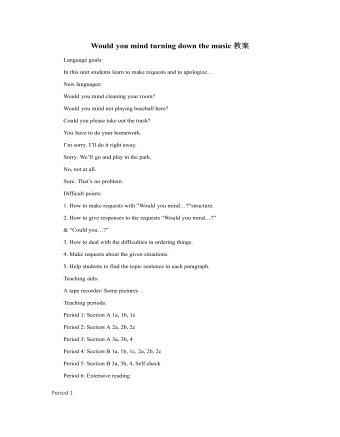
人教版新目标初中英语八年级下册Would you mind turning down the music教案
Step 4. Group work (4)1. Ask a pair of students to read the dialogue. Say, This activity provides speaking, listening and writing practice using the target language.2. Ask students to complete the work in groups.3. Check the answers with the whole class. 4. Explain some of the language points. Step 5. Word review (Self check 1)1. Ask students to read the words and the phrases given. 2. Fill in the blanks with proper forms of these words to complete the sentences. 3. Check the answers with the whole class. Homework:Do activity 2 on page 57 after class. Period 6Teaching aims: 1. Teach vocabulary words and the useful expressions. 2. Enable the students to learn etiquette in different culture. 3. Help the students learn how to behave politely in public places and in daily life. Teaching procedures:Step 1. RevisionHelp students to review the function of making requests through a free talk. Then lead them to the topic of etiquette. Explain the meaning of etiquette. Or, ask students to look it up in the dictionary. Step 2. Pre-reading (Section 1)1. Ask students to read the picture and make a list with their partner about how many rules of etiquette can be seen being broken.

人教版新目标初中英语九年级下册By the time I got outside, the bus had already left教案
Ⅰ. Teaching Aims and Demands1. Knowledge Objects(1) Key Vocabularyoversleep(2) Target LanguageWhat happened?I overslept. And by the time I got up, my brother had already gotten in the shower.2. Ability Objects(1) Teach the students to use the new words.(2) Train the students to narrate past events with the Past Perfect Tense.(3) Train the students' listening and speaking skills with the target language.3. Moral ObjectIt’s a good habit to go to bed early in the evening and get up early in the morning. So you’ll never be in a hurry in the morning.Ⅱ. Teaching Key Points1. Key Vocabularyoversleep2. Target LanguageNarrate past events with the Past Perfect TenseⅢ. Teaching Difficult Points1. Train the students to narrate past events with the Past Perfect Tense.2. Train the students to understand the target language in spoken conversation.Ⅳ. Teaching Methods1. Thinking of examples from the students' real lives.2. Making sentences by looking at the pictures.Ⅴ. Teaching AidA tape recorderⅥ. Teaching ProceduresStep I Revision1. Revise the language points in Unit 8.Ask some questions like this: What volunteer work would you like to do?Help the students to answer, I’d like to…/I love to…/I hope to2. Practice the dialogue in Activity 3c on page 62 again. Get students to role play the similar dialogues with the following.

人教版新目标初中英语九年级下册I’ll help clean up the city parks教案
Talk about offering help (P60)I’ll help clean up the city parks.A: I’d like to work ...B: You could help ...Talk about ways to tell people about the Clean-Up Day (P61)We need to ...We can’t ...I’ll ...Talk about the work the volunteers do (P62)These three students all volunteer their time to help other people.Somebody loves to ... / helps ... / plans to ... / wants to ...A: What do you like doing?B: I like ... A: What kind of volunteer work do you think I could do?B: You could ...1. 重点词汇advertisement, fix, repair, pleasure, blind, deaf, shut, carry, specially, fetch2. 认读词汇hunger, homeless, cheer, clean-up, sign, establish, major, commitment, elementary, veterinarian, coach, similar, call-in, strategy, disabled, organization, unable, support, appreciate, donation, part of speech, pronoun, adverb, preposition, conjunction, donate, Jimmy, Sally3. 词组clean up, cheer up, give out, put off, set up, think up, take after, fix up, give away, put up, hand out, work out, at once

人教版新目标初中英语九年级下册You’re supposed to shake hands教案
教学目标:1. 掌握本单元一些重点词汇的写法和用法。2. 学会自如谈论餐桌礼仪。Step 1 RevisionAsk some students to retell the customs at the table in France in the passage in 3a.Step 2 Self checkPart 1. Fill in each bland with the correct word given. Students do the exercises by themselves at first. Then check the answers. Ask the students to comprehend the sentences and help them point out uses of some words, like “arrive (at / in) sw., spend time / money on sth , spend time / money (in) doing sth.”Part 2. Read about Fan Ling’s experience in a western restaurant. Understand the passage. Point out some key points in the passage.1. be / get used to doing sth. 习惯做某事2. begin with = start with 以….开头3. crowd v. 挤满,塞满 the crowd 人群 crowded adj. 拥挤的Then students discuss about how she would solve her problem. Ask some to share their stories with others.Part 3. Complete the crossword by looking at the sentences on the left. Then check the answers.


